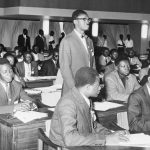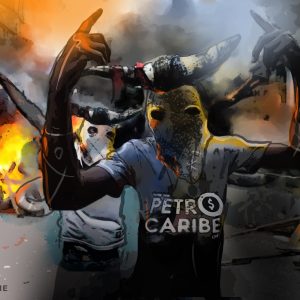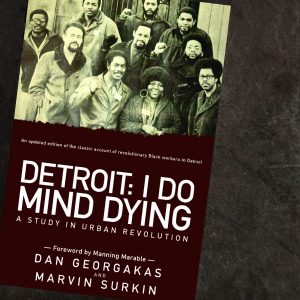Fidel Castro’s 10 days in Harlem changed the world
Historian Simon Hall’s new book recounts the Cuban leader’s visit to New York to address the UN General Assembly and how it altered the course of 20th-century politics.
Author:
9 February 2021

Looking back at the events of the year 1960, it’s tempting to paraphrase Lenin’s quote as “there are decades where nothing happens, and then a year in which decades happen”. The epochal 1960 began with Cameroon gaining independence on 1 January and ended with Mauritania becoming free on 28 November. A total of 17 African countries became independent that year, which is what British prime minister Harold Macmillan meant in his “winds of change” speech delivered in Parliament in Cape Town on 3 February that year.
Nineteen-sixty was also important in countries – especially the Congo, Southern Rhodesia (now Zimbabwe) and South Africa – where, to keep up with Macmillan’s metaphor, the wind morphed into a whirlwind and the situation took a turn for the worse as the forces of racism couldn’t cloak their intentions any longer.
Related article:
In the Congo, Patrice Lumumba had become prime minister on 30 June, but he would be toppled a few months later. In Southern Rhodesia, racist forces doubled down. What was dubbed the “partnership” – white and black mutual cooperation that would have seen Southern Rhodesia gain independence along with the two protectorates Nyasaland (Malawi) and Northern Rhodesia (Zambia) in the Central African Federation – exploded. Even though the Rhodesian Front, the party which declared an illegal independence in 1965, was formed in 1962, the forces that gave birth to it had been given a lift by the wind blowing in the Congo and the fate of the Belgian refugees.
In South Africa, the Nationalist government’s police killed 69 protesters in Sharpeville, a township outside Johannesburg, on 21 March 1960. In that same year, the Nationalists also banned the ANC and the Pan Africanist Congress of Azania and, a few years later, arraigned ANC leaders on trial. In Namibia, the South West African People’s Organisation (Swapo) was formed in 1960 to resist occupation by apartheid South Africa.
And as fate would have it, 1960 wasn’t just a great year for Africans, but also a significant one for Fidel Castro and the Third World cause he championed.
The Horse and the shoeshine boy
It began innocently enough one September afternoon. Just before the Cuban leader snacked on spicy oysters in a trendy Havana street, he had gone up to a shoeshine boy and asked him: “What do you say I go up to New York and speak at the United Nations?” Using Castro’s nickname, the boy replied: “Caballo (the Horse), get on up there and put it to those damn Yankees.”
Before long, according to British historian Simon Hall’s crisp and immensely readable book Ten Days in Harlem: Fidel Castro and the Making of the 1960s, an account of the 10 fitful days that changed the course of 20th-century global history, rumour in Havana was that Castro was due to go to New York to the United Nations’ 15th General Assembly session.
Related article:
On the morning of Sunday 18 September, as Castro prepared to leave for New York, his mother Lina Ruz worried over her son. “Ay! Don’t worry, old woman. I’ve taken worse trips than this, and nothing’s happened to me yet. Remember the Granma…” he said. Castro was referring to the ill-fated trip he and 81 other rebels had taken in a ramshackle yacht in November 1956. After the death or capture of about 60 of the rebels once they had embarked, Castro and his brother Raúl, the Argentine doctor Che Guevara and the rest of the survivors regrouped in the mountains. A little over three years later, on 8 January 1959, Castro and his 26th of July Movement marched into Havana after the fall of the Batista dictatorship.
By the time Castro arrived in New York in 1960, relations between Havana and Washington DC were at what Hall describes as a “breaking point”. This was because of Cuba’s economic and agrarian policies, which favoured ordinary citizens and were hostile to the interests of Cuban elites and their imperialist buddies in the United States, as well as Castro’s clampdown on the country’s press and judiciary. As if this was not enough, Cuba was increasingly turning to the Eastern Bloc, with whom it had signed trade deals and from where the island nation had acquired arms.
Hotel hopping in the Big Apple
The plan had been to stay at the Hotel Elysée in New York, but its manager cancelled the reservation when he learned that the party would be larger than he had expected. No hotel in New York wanted to take in the revolutionaries. One owner who initially took them in was blunt about his animosity: “We personally have strong feelings against the Cuban leader and prefer not to accommodate him.” The Cubans spurned his offer as well as another one personally organised by UN secretary general Dag Hammerskjöld, and instead opted to stay at the Hotel Theresa, a not-so-great establishment in Harlem, the capital of the Black world.
When African Americans heard the “electrifying news” that the Cubans had chosen to stay in their working-class neighbourhood, they were naturally ecstatic at the honour and thousands streamed to the hotel to pay their respects. “That cat and his gang may have fought in those mountains … and whipped that dictator Batista,” one local quipped, “but if they can stand the bedbugs in the Theresa, I’ll know they’re real revolutionaries.”
Related article:
Before long, Nation of Islam preacher and Black radical Malcolm X, one of many prominent visitors who went to the hotel, visited Castro in his suite after midnight. “No one knows the master better than his servants. We have been servants ever since we were brought here,” Malcolm X said as he prepared to leave. Later, Malcolm X said of Castro that he was the “only white person I have really liked”. His cosiness with Castro went against the stance of the Nation of Islam’s head, Elijah Muhammad, who despised Communism (“I don’t like it because it’s atheistic”), and was counter to the currents of mainstream American opinion, which had turned against the Cubans by 1960.
In general Black America, however, it would be a while before Blacks became hostile to Cuba; it hadn’t escaped the notice of African Americans that the biggest opponents of Castro happened also to be avowed segregationists.
Warm meetings and cold shoulders
The very next day, 20 September, Soviet leader Nikita Khrushchev drove to Harlem to meet with Castro. The Cuban leader had offered to go to the Soviet mission, naturally in a cleaner, posher side of town, but Khrushchev would have none of it. “By going to a Negro hotel in a Negro district, we would be making a double demonstration against the discriminatory policies of the United States of America toward Negroes, as well as toward Cuba,” the Soviets reasoned.
Even though the meeting lasted only 22 minutes, it was a milestone in global history (some days later, Castro reciprocated the meeting). The previous year, when Castro had visited the US soon after his revolution, president Dwight Eisenhower had chosen to be out of town rather than meet with him. Instead, Castro met with his deputy, Richard Nixon. By the time that Khrushchev and Castro met for the first time in New York, a decision had already been made in Washington DC to bring about the “replacement of the Castro regime with one more devoted to the true interests of the Cuban people and more acceptable to the US”. The consequence of this decision was the botched Bay of Pigs invasion in 1961 in which US-trained surrogates were routed by Castro and his forces.
The coldness of the Americans towards the Cubans is evident in that, when Eisenhower addressed the UN General Assembly on Thursday 22 September and afterwards hosted a luncheon for the heads of the 18 Latin-American delegations in town for the summit, Castro wasn’t invited. Instead of sulking, he decided to use the snub to further his cause. “We are not sad,” Castro said. “We are going to take it easy.” He then invited 12 employees of the Hotel Theresa to a lunch of steaks and beers in the hotel’s coffee shop. It was a gesture with which he wanted to show that he was “honoured to lunch with the poor and humble people of Harlem”.
Related article:
A day after Castro’s snub, the Soviet leader, with whom he was developing warm feelings, delivered his speech, one that some described as “fighting talk”. Khrushchev hailed the decolonisation taking place in Africa (“a great hallmark of our epoch”) and those countries in Africa, Asia and Latin America that were “beginning to take an active part in the determination of the destinies of the whole world”. He acknowledged the real reversals taking place in the Congo under the “legitimate leadership” of Lumumba while also hailing the struggles in Algeria, Kenya, Uganda and other colonies. “When the peoples rise up to struggle for their freedom, for a better life, no force in the world can stop this mighty movement,” Khrushchev declared. The West didn’t like the speech at all, but Castro demonstrated his adulation of Khrushchev by leaping to his feet and clapping his hands together with the Cuban delegation.
That Cuba and the Soviet Union later became great allies wasn’t preordained. “When Fidel Castro’s forces came sweeping out of the Sierra Maestra and seized Havana in 1959,” Hall quotes William Chase Taubman, Khrushchev’s biographer, “Moscow had no clear idea of who they were and what they stood for.” Even though Raúl Castro had been a member of the Cuban Communist Party, his brother could have pursued an independent course. However, writes Hall, “in the face of implacable American opposition to its radical economic policies, the government in Havana began to reach out to the Soviet Union”.
Other interactions
New York 1960 wasn’t just about Castro and the Soviets. Gamal Abdel Nasser, the president of the United Arab Republic (federation of Egypt and Syria), had overcome his initial reluctance to go to New York. Soon after his arrival, he met Khrushchev and the following day travelled to the Hotel Theresa to meet Castro. Even though the personal chemistry between the two was off, Nasser invited Castro to join a neutralist camp to “construct a diplomatic alliance to stand between East and West”. While Castro’s response to the request was initially non-committal, he later gravitated towards the idea and, in 1961, Cuba became a founding member of the Non-Aligned Movement.
Other Third World leaders Castro met in New York were the Ghanaian leader Kwame Nkrumah and the Indian hero Jawaharlal Nehru, who went to the Hotel Theresa to meet the Cuban. “I wanted to meet you for many reasons,” Nehru enthused, “above all, because you are a very brave man.” Castro reciprocated: “If you had not come, I would have come to you.”
Related article:
The 10th day of Castro’s stay in New York, Monday 26 September, was the one on which the Cuban revolutionary addressed the General Assembly. “Although it has been said that I speak at great length,” Castro diffidently began, “you may rest assured that we will endeavour to be brief.”
At the beginning of his talk, he complained of the treatment he and his party had gone through in New York and thanked the Hotel Theresa for taking him in. He then expanded on Cuba’s relations with the US, a period during which the island was “a virtual colony of the United States”. He justified his radical economic policies of nationalisation, agrarian reform and his revolution’s achievements thus far: 10 000 new schools and 25 000 houses built, and advances in access to medical treatment for ordinary Cubans. Castro also pointed out that what “was yesterday a land without hope, a land of misery, a land of illiteracy, is gradually becoming one of the most enlightened, advanced and developed nations of this continent”. And then he decried the injustice of Guantanamo Bay, the piece of land in Cuba that has been US territory since 1903.
Moving away from home politics to the rest of the world, but still linking the fate of the island to other colonised lands, Castro spoke about the Congo and Algeria, saying that “the case of Cuba is the case of all the underdeveloped and colonised countries”. And on and on he went, until he had clocked four hours and 30 minutes – still a UN record. (In 1986 in Cuba, Castro is said to have delivered an even longer speech, at over seven hours.)
Connections in context
Looking back on those 10 febrile days, the two people who, more than anyone else, emerged with their credentials burnished are perhaps Castro and Khrushchev. Castro reached out to the Third World and placed his own Cuban revolution in the context of the decolonisation process that had kicked off following the end of World War II. Khrushchev was succeeding Stalin, who, considering liberation movements that were not communist as “class enemies”, had been reluctant to give them support.
Khrushchev was different and was keen to follow a different path.
As a result of Khrushchev, the Zimbabwe African People’s Union in Southern Rhodesia, the People’s Movement for the Liberation of Angola in Angola, Frelimo in Mozambique and the ANC became eligible and, indeed, received support from the Soviet Union. During the UN summit, he attended every reception taking place and was keen to work with the formerly colonised countries. Today, Khrushchev said, organisations from the formerly colonised nations “need not go begging for up-to-date equipment to their former oppressors”.
Related article:
The US, on the other hand, emerged with its status diminished. Eisenhower was reluctant to court the new African nations (there were 15 at the UN General Assembly), telling his Cabinet that he “couldn’t have a lunch or a dinner for each of them – it takes too much out of the day”.
Wednesday 28 September 1960 was Castro’s last day in New York. As he was about to board a plane loaned to him by the Soviets (the Cubans’ had been impounded by American creditors, against the tenets of international law), he was asked whether he was a communist. He replied: “I am the same man, doing in Cuba what we promised to do in Cuba. This revolution is the revolution of humble people – something like Lincoln said.” And then, giving another iteration of his already famous line, “History will absolve me”, Castro said: “Wait for history, history will tell who we are.”






